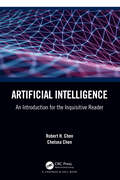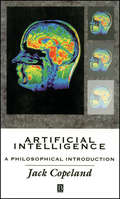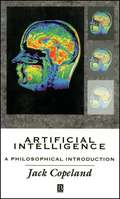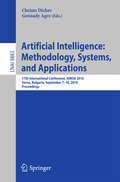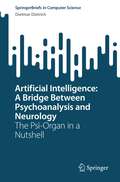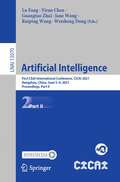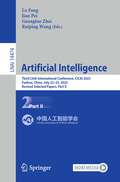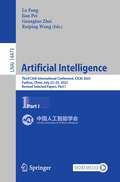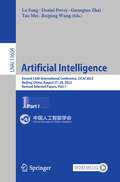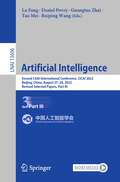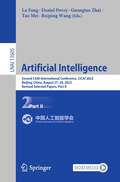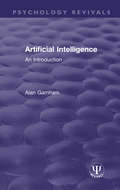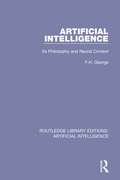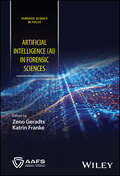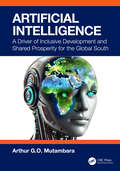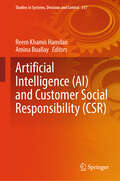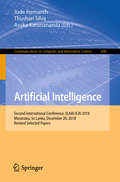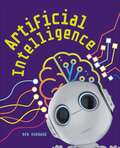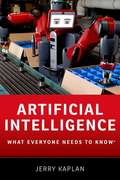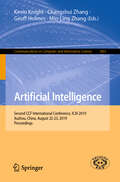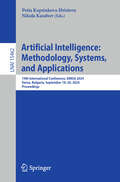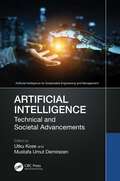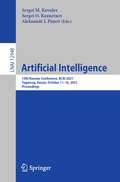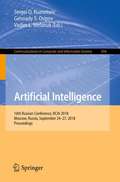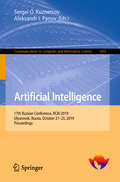- Table View
- List View
Artificial Intelligence: An Introduction for the Inquisitive Reader
by Robert H. Chen Chelsea C. ChenArtificial Intelligence: An Introduction for the Inquisitive Reader guides readers through the history and development of AI, from its early mathematical beginnings through to the exciting possibilities of its potential future applications. To make this journey as accessible as possible, the authors build their narrative around accounts of some of the more popular and well-known demonstrations of artificial intelligence including Deep Blue, AlphaGo and even Texas Hold’em, followed by their historical background, so that AI can be seen as a natural development of mathematics and computer science. As the book moves forward, more technical descriptions are presented at a pace that should be suitable for all levels of readers, gradually building a broad and reasonably deep understanding and appreciation for the basic mathematics, physics, and computer science that is rapidly developing artificial intelligence as it is today. Features Only mathematical prerequisite is an elementary knowledge of calculus Accessible to anyone with an interest in AI and its mathematics and computer science Suitable as a supplementary reading for a course in AI or the History of Mathematics and Computer Science in regard to artificial intelligence.
Artificial Intelligence: A Philosophical Introduction
by Jack CopelandPresupposing no familiarity with the technical concepts of either philosophy or computing, this clear introduction reviews the progress made in AI since the inception of the field in 1956. Copeland goes on to analyze what those working in AI must achieve before they can claim to have built a thinking machine and appraises their prospects of succeeding. There are clear introductions to connectionism and to the language of thought hypothesis which weave together material from philosophy, artificial intelligence and neuroscience. John Searle's attacks on AI and cognitive science are countered and close attention is given to foundational issues, including the nature of computation, Turing Machines, the Church-Turing Thesis and the difference between classical symbol processing and parallel distributed processing. The book also explores the possibility of machines having free will and consciousness and concludes with a discussion of in what sense the human brain may be a computer.
Artificial Intelligence: A Philosophical Introduction
by Jack CopelandPresupposing no familiarity with the technical concepts of either philosophy or computing, this clear introduction reviews the progress made in AI since the inception of the field in 1956. Copeland goes on to analyze what those working in AI must achieve before they can claim to have built a thinking machine and appraises their prospects of succeeding. There are clear introductions to connectionism and to the language of thought hypothesis which weave together material from philosophy, artificial intelligence and neuroscience. John Searle's attacks on AI and cognitive science are countered and close attention is given to foundational issues, including the nature of computation, Turing Machines, the Church-Turing Thesis and the difference between classical symbol processing and parallel distributed processing. The book also explores the possibility of machines having free will and consciousness and concludes with a discussion of in what sense the human brain may be a computer.
Artificial Intelligence: 17th International Conference, AIMSA 2016, Varna, Bulgaria, September 7-10, 2016, Proceedings (Lecture Notes in Computer Science #9883)
by Christo Dichev Gennady AgreThis book constitutes the refereed proceedings of the 17th International Conference on Artificial Intelligence: Methodology, Systems, and Applications, AIMSA 2016, held in Varna, Bulgaria in September 2015. The 32 revised full papers 6 poster papers presented were carefully reviewed and selected from 86 submissions. They cover a wide range of topics in AI: from machine learning to natural language systems, from information extraction to text mining, from knowledge representation to soft computing; from theoretical issues to real-world applications.
Artificial Intelligence: The Psi-Organ in a Nutshell (SpringerBriefs in Computer Science)
by Dietmar DietrichTo be able to merge the psyche with the neural system has been a long-sought goal. There is much scientific literature on results from research on this topic, but the goal of this “booklet” is to present the subject in a nutshell and to attract a wider audience to this highly complex topic. Scientists often need years to grasp the scope and implications of merging the psyche with the neural system. Does that really have to be the case? What does the simulated model look like? What are the underlying philosophies? Can it be understood without mathematical formalism? Uniting the psyche and neurology in one model, on the one hand, allows psychological and social theories to be tested on a scientific basis using simulation experiments. On the other hand, a model developed according to the functional structures of the human brain, let us call it the Psi-Organ, which comprises neurology and psyche as one unit, can serve as a basis for AI systems. These can be systems with cognitive capabilities that save human lives, save energy, ensure safety at airports, provide support in caring for the elderly and much more. In other words, systems that can simplify our lives in the most relevant ways and on a broad basis. This model, the Psi-Organ, goes far beyond today's primarily behavior-based AI methods. The manuscript can serve as an excellent introduction to the problem of understanding and modelling the human mind, and to the problem of achieving artificial “intelligence” in general, increasing awareness and understanding for the associated challenges. In that regard, it is a valuable supplementary text for advanced students or researchers in the field, notably not only in AI, but also (and perhaps primarily) in the medical fields.
Artificial Intelligence: First CAAI International Conference, CICAI 2021, Hangzhou, China, June 5–6, 2021, Proceedings, Part II (Lecture Notes in Computer Science #13070)
by Lu Fang Yiran Chen Guangtao Zhai Jane Wang Ruiping Wang Weisheng DongThis two-volume set LNCS 13069-13070 constitutes selected papers presented at the First CAAI International Conference on Artificial Intelligence, held in Hangzhou, China, in June 2021. Due to the COVID-19 pandemic the conference was partially held online. The 105 papers were thoroughly reviewed and selected from 307 qualified submissions. The papers are organized in topical sections on applications of AI; computer vision; data mining; explainability, understandability, and verifiability of AI; machine learning; natural language processing; robotics; and other AI related topics.
Artificial Intelligence: Third CAAI International Conference, CICAI 2023, Fuzhou, China, July 22–23, 2023, Revised Selected Papers, Part II (Lecture Notes in Computer Science #14474)
by Lu Fang Jian Pei Guangtao Zhai Ruiping WangThis two-volume set LNAI 14473-14474 constitutes revised selected papers presented at the Third CAAI International Conference, CICAI 2023, in Fuzhou, China, in July 2023. CICAI is a summit forum in the field of artificial intelligence and the 2023 forum was hosted by Chinese Association for Artificial Intelligence (CAAI). The 100 papers were thoroughly reviewed and selected from 376 submissions. CICAI 2023 conference covers a wide range of of AI generated content, computer vision, machine learning, nature language processing, application of AI, and data mining, amongst others.
Artificial Intelligence: Third CAAI International Conference, CICAI 2023, Fuzhou, China, July 22–23, 2023, Revised Selected Papers, Part I (Lecture Notes in Computer Science #14473)
by Lu Fang Jian Pei Guangtao Zhai Ruiping WangThis two-volume set LNAI 14473-14474 constitutes revised selected papers presented at the Third CAAI International Conference, CICAI 2023, in Fuzhou, China, in July 2023. CICAI is a summit forum in the field of artificial intelligence and the 2023 forum was hosted by Chinese Association for Artificial Intelligence (CAAI). The 100 papers were thoroughly reviewed and selected from 376 submissions. CICAI 2023 conference covers a wide range of of AI generated content, computer vision, machine learning, nature language processing, application of AI, and data mining, amongst others.
Artificial Intelligence: Second CAAI International Conference, CICAI 2022, Beijing, China, August 27–28, 2022, Revised Selected Papers, Part I (Lecture Notes in Computer Science #13604)
by Lu Fang Daniel Povey Guangtao Zhai Tao Mei Ruiping WangThis three-volume set LNCS 13604-13606 constitutes revised selected papers presented at the Second CAAI International Conference on Artificial Intelligence, held in Beijing, China, in August 2022. CICAI is a summit forum in the field of artificial intelligence and the 2022 forum was hosted by Chinese Association for Artificial Intelligence (CAAI).The 164 papers were thoroughly reviewed and selected from 521 submissions. CICAI aims to establish a global platform for international academic exchange, promote advanced research in AI and its affiliated disciplines such as machine learning, computer vision, natural language, processing, and data mining, amongst others.
Artificial Intelligence: Second CAAI International Conference, CICAI 2022, Beijing, China, August 27–28, 2022, Revised Selected Papers, Part III (Lecture Notes in Computer Science #13606)
by Lu Fang Daniel Povey Guangtao Zhai Tao Mei Ruiping WangThis three-volume set LNCS 13604-13606 constitutes revised selected papers presented at the Second CAAI International Conference on Artificial Intelligence, held in Beijing, China, in August 2022. CICAI is a summit forum in the field of artificial intelligence and the 2022 forum was hosted by Chinese Association for Artificial Intelligence (CAAI). The 164 papers were thoroughly reviewed and selected from 521 submissions. CICAI aims to establish a global platform for international academic exchange, promote advanced research in AI and its affiliated disciplines such as machine learning, computer vision, natural language, processing, and data mining, amongst others.
Artificial Intelligence: Second CAAI International Conference, CICAI 2022, Beijing, China, August 27–28, 2022, Revised Selected Papers, Part II (Lecture Notes in Computer Science #13605)
by Lu Fang Daniel Povey Guangtao Zhai Tao Mei Ruiping WangThis three-volume set LNCS 13604-13606 constitutes revised selected papers presented at the Second CAAI International Conference on Artificial Intelligence, held in Beijing, China, in August 2022. CICAI is a summit forum in the field of artificial intelligence and the 2022 forum was hosted by Chinese Association for Artificial Intelligence (CAAI). The 164 papers were thoroughly reviewed and selected from 521 submissions. CICAI aims to establish a global platform for international academic exchange, promote advanced research in AI and its affiliated disciplines such as machine learning, computer vision, natural language, processing, and data mining, amongst others.
Artificial Intelligence: An Introduction (Psychology Revivals)
by Alan GarnhamFirst published in 1987, this book provides a stimulating introduction to artificial intelligence (AI) - the science of thinking machines. After a general introduction to AI, including its history, tools, research methods, and its relation to psychology, Garnham gives an account of AI research in five major areas: knowledge representation, vision, thinking and reasoning, language, and learning. He then describes the more important applications of AI and discusses the broader philosophical issues raised by the possibility of thinking machines. In the final chapter, he speculates about future research in AI, and more generally in cognitive science. Suitable for psychology students, the book also provides useful background reading for courses on vision, thinking and reasoning, language and learning.
Artificial Intelligence: Its Philosophy and Neural Context (Routledge Library Editions: Artificial Intelligence)
by F. H. GeorgeOriginally published in 1986, in order to probe, dispute and analyse the role of artificial intelligence in cybernetic thought and information science, the author pursues this topic within its philosophical, behavioral and neurophysiological contexts, while drawing attention to cognitive issues. By elucidating the problems and potential associated with knowledge-based systems, the book emphasized the need to examine artificial intelligence in its own right.
Artificial Intelligence (Forensic Science in Focus)
by Zeno Geradts Katrin FrankeARTIFICIAL INTELLIGENCE (AI) IN FORENSIC SCIENCES Foundational text for teaching and learning within the field of Artificial Intelligence (AI) as it applies to forensic science Artificial Intelligence (AI) in Forensic Sciences presents an overview of the state-of-the-art applications of Artificial Intelligence within Forensic Science, covering issues with validation and new crimes that use AI; issues with triage, preselection, identification, argumentation and explain ability; demonstrating uses of AI in forensic science; and providing discussions on bias when using AI. The text discusses the challenges for the legal presentation of AI data and interpretation and offers solutions to this problem while addressing broader practical and emerging issues in a growing area of interest in forensics. It builds on key developing areas of focus in academic and government research, providing an authoritative and well-researched perspective. Compiled by two highly qualified editors with significant experience in the field, and part of the Wiley — AAFS series ‘Forensic Science in Focus’, Artificial Intelligence (AI) in Forensic Sciences includes information on: Cyber IoT, fundamentals on AI in forensic science, speaker and facial comparison, and deepfake detection Digital-based evidence creation, 3D and AI, interoperability of standards, and forensic audio and speech analysis Text analysis, video and multimedia analytics, reliability, privacy, network forensics, intelligence operations, argumentation support in court, and case applications Identification of genetic markers, current state and federal legislation with regards to AI, and forensics and fingerprint analysis Providing comprehensive coverage of the subject, Artificial Intelligence (AI) in Forensic Sciences is an essential advanced text for final year undergraduates and master’s students in forensic science, as well as universities teaching forensics (police, IT security, digital science and engineering), forensic product vendors and governmental and cyber security agencies.
Artificial Intelligence: A Driver of Inclusive Development and Shared Prosperity for the Global South
by Arthur G.O. MutambaraThis book presents contextualised and detailed research on Artificial Intelligence (AI) and the Global South. It examines the key challenges of these emerging and least industrialised countries while proffering holistic and comprehensive solutions. The book then explains how AI, as part of these broad interventions, can drive Global South economies to achieve inclusive development and shared prosperity. The book outlines how countries can swiftly prepare to adopt and develop AI across all sectors. It presents novel national, regional, and continental AI adoption, development, and implementation frameworks.Features: Broad non-AI interventions and prescriptions to address Global South challenges A comprehensive but accessible introduction to AI concepts, technology, infrastructure, systems, and innovations such as AlphaFold, ChatGPT-4, and DeepSeek-R1 An overview of AI-related technologies such as quantum computing, battery energy storage systems, 3D printing, nanotechnology, IoT, and blockchain How to prepare emerging economies to unlock the benefits of AI while mitigating the risks Discussion of specific AI applications in 11 critical Global South sectors Details of 11 sector case studies of AI adoption in the Global South and Global North Ten country case studies: Sharing emergent AI experiences in the Global South AI adoption framework: vision, strategy, policy, governance, legislation/regulation, and implementation matrix A framework for democratising and decolonising AI The value proposition for AI research, development, and ownership in the Global South A case for the participation of the Global South in the AI semiconductor industry This book is aimed at policymakers, business leaders, graduate students, academics, researchers, strategic thinkers, and world leaders seeking to understand and leverage the transformative role of AI-based systems in achieving inclusive development, economic transformation, and shared prosperity.
Artificial Intelligence (Studies in Systems, Decision and Control #517)
by Reem Khamis Hamdan Amina BuallayThe impact of artificial intelligence (AI) on business and society has been significant, with the incorporation of AI technologies such as robots, facial recognition, algorithms, and natural language processing into business leading to both corporate benefits and potential challenges for stakeholders. The question of how to engage in responsible business practices in the era of AI is an important one, and there is a need for more research on the relationship between AI and corporate social responsibility (CSR). As AI becomes more prevalent, there is a growing focus on the ethical implications of AI and the potential for AI to perpetuate biases or to displace human workers. CSR initiatives can include considerations of ethical AI in the development and use of AI systems. AI has the potential to solve many global challenges and improve people's lives, but it can also have negative consequences if not developed and used responsibly. CSR initiatives can focus on the social impact of AI,including efforts to ensure that the benefits of AI are distributed fairly and that AI is used for the common good. CSR initiatives often involve engaging with stakeholders, including employees, customers, and communities, to understand their needs and concerns and to ensure that their interests are taken into account. This can include engaging with stakeholders about the use of AI in the organization and its potential impactsThe adoption of AI in business is changing many aspects of doing business in a socially responsible manner, and there is a need to examine the potential unethical behaviors and novel ways of engaging in CSR that may arise. This book aims to focus on AI and CSR, and to advance our understanding of the role of AI in organizations and the literature on CSR by assembling high-quality papers with a strong connection between theory and practice.
Artificial Intelligence: Second International Conference, SLAAI-ICAI 2018, Moratuwa, Sri Lanka, December 20, 2018, Revised Selected Papers (Communications in Computer and Information Science #890)
by Jude Hemanth Thushari Silva Asoka KarunanandaThis book constitutes the refereed proceedings of the Second International Conference, SLAAI-ICAI 2018, held in Moratuwa, Sri Lanka, in December 2018.The 32 revised full papers presented were carefully reviewed and selected from numerous submissions. The papers are organized in the following topical sections: intelligence systems; neural networks; game theory; ontology engineering; natural language processing; agent based system; signal and image processing.
Artificial Intelligence: What Everyone Needs to Know
by Jerry KaplanOver the coming decades, Artificial Intelligence will profoundly impact the way we live, work, wage war, play, seek a mate, educate our young, and care for our elderly. It is likely to greatly increase our aggregate wealth, but it will also upend our labor markets, reshuffle our social order, and strain our private and public institutions. Eventually it may alter how we see our place in the universe, as machines pursue goals independent of their creators and outperform us in domains previously believed to be the sole dominion of humans. Whether we regard them as conscious or unwitting, revere them as a new form of life or dismiss them as mere clever appliances, is beside the point. They are likely to play an increasingly critical and intimate role in many aspects of our lives. The emergence of systems capable of independent reasoning and action raises serious questions about just whose interests they are permitted to serve, and what limits our society should place on their creation and use. Deep ethical questions that have bedeviled philosophers for ages will suddenly arrive on the steps of our courthouses. Can a machine be held accountable for its actions? Should intelligent systems enjoy independent rights and responsibilities, or are they simple property? Who should be held responsible when a self-driving car kills a pedestrian? Can your personal robot hold your place in line, or be compelled to testify against you? If it turns out to be possible to upload your mind into a machine, is that still you? The answers may surprise you.
Artificial Intelligence: Second CCF International Conference, ICAI 2019, Xuzhou, China, August 22-23, 2019, Proceedings (Communications in Computer and Information Science #1001)
by Kevin Knight Changshui Zhang Geoff Holmes Min-Ling ZhangThis book constitutes the refereed proceedings of the Second CCF International Conference on Artificial Intelligence, CCF-ICAI 2019, held in Xuzhou, China in August, 2019. The 23 papers presented were carefully reviewed and selected from 97 submissions. The papers are organized in topical sections on deep learning, image and video processing, NLP and recommender system, machine learning algorithms, and AI applications.
Artificial Intelligence: 19th International Conference, AIMSA 2024, Varna, Bulgaria, September 18–20, 2024, Proceedings (Lecture Notes in Computer Science #15462)
by Petia Koprinkova-Hristova Nikola KasabovThis book constitutes the refereed proceedings of the 19th International Conference on Artificial Intelligence: Methodology, Systems, and Applications, AIMSA 2024, held in Varna, Bulgaria, during September 18–20, 2024. The 18 revised full papers presented in this book were carefully reviewed and selected from 23 submissions. They cover a wide range of topics in AI and its applications: natural language processing, sentiment analyses, image processing, optimization, reinforcement learning, from deep ANNs to spike timing NNs, applications in economics, medicine and process control.
Artificial Intelligence: Technical and Societal Advancements (Artificial Intelligence for Sustainable Engineering and Management)
by Utku Kose Mustafa Umut DemirezenThis book provides an examination of cutting-edge research and developments in the field of artificial intelligence. It seeks to extend the view in both technical and societal evaluations to ensure a well-defined balance for societal outcomes. It explores hot topics such as generative artificial intelligence, artificial intelligence in law, education, and climate change.Artificial Intelligence: Technical and Societal Advancements seeks to bridge the gap between theory and practical applications of AI by giving readers insight into recent advancements. It offers readers a deep dive into the transformative power of AI for the present and future world. As artificial intelligence continues to revolutionize various sectors, the book discusses applications from healthcare to finance and from entertainment to industrial areas. It discusses the technical aspects of intelligent systems and the effects of these aspects on humans. To this point, this book considers technical advancements while discussing the societal pros and cons in terms of human-machine interaction in critical applications. The authors also stress the importance of deriving policies and predictions about how to make future intelligent systems compatible with humans through a necessary level of human management. Finally, this book provides the opinions and views of researchers and experts (from public/private sector) including educators, lawyers, policymakers, managers, and business-related representatives.The target readers of this book include academicians; researchers; experts; policymakers; educators; and B.S., M.S., and Ph.D. students in the context of target problem fields. It can be used accordingly as a reference source and even supportive material for artificial intelligence-oriented courses.
Artificial Intelligence: 19th Russian Conference, RCAI 2021, Taganrog, Russia, October 11–16, 2021, Proceedings (Lecture Notes in Computer Science #12948)
by Sergei M. Kovalev Sergei O. Kuznetsov Aleksandr I. PanovThis book constitutes the proceedings of the 19th Russian Conference on Artificial Intelligence, RCAI 2021, held in Moscow, Russia, in October 2021. The 19 full papers and 7 short papers presented in this volume were carefully reviewed and selected from 80 submissions. The conference deals with a wide range of topics, categorized into the following topical headings: cognitive research; data mining, machine learning, classification; knowledge engineering; multi-agent systems and robotics; natural language processing; fuzzy models and soft computer; intelligent systems; and tools for designing intelligent systems.
Artificial Intelligence: 16th Russian Conference, Rcai 2018, Moscow, Russia, September 24-26, 2018, Proceedings (Communications In Computer And Information Science #934)
by Sergei O. Kuznetsov Gennady S. Osipov Vadim L. StefanukThis book constitutes the proceedings of the 16th Russian Conference on Artificial Intelligence, RCAI 2018, Moscow, Russia, in September 2018. The 22 full papers presented along with 4 short papers in this volume were carefully reviewed and selected from 75 submissions. The conference deals with a wide range of topics, including data mining and knowledge discovery, text mining, reasoning, decision making, natural language processing, vision, intelligent robotics, multi-agent systems, machine learning, ontology engineering.
Artificial Intelligence: 17th Russian Conference, RCAI 2019, Ulyanovsk, Russia, October 21–25, 2019, Proceedings (Communications in Computer and Information Science #1093)
by Sergei O. Kuznetsov Aleksandr I. PanovThis book constitutes the proceedings of the 17th Russian Conference on Artificial Intelligence, RCAI 2019, held in Ulyanovsk, Russia, in October 2019. The 23 full papers presented along with 7 short papers in this volume were carefully reviewed and selected from 130 submissions. The conference deals with a wide range of topics, including multi-agent systems, intelligent robots and behaviour planning; automated reasoning and data mining; natural language processing and understanding of texts; fuzzy models and soft computing; intelligent systems and applications.
